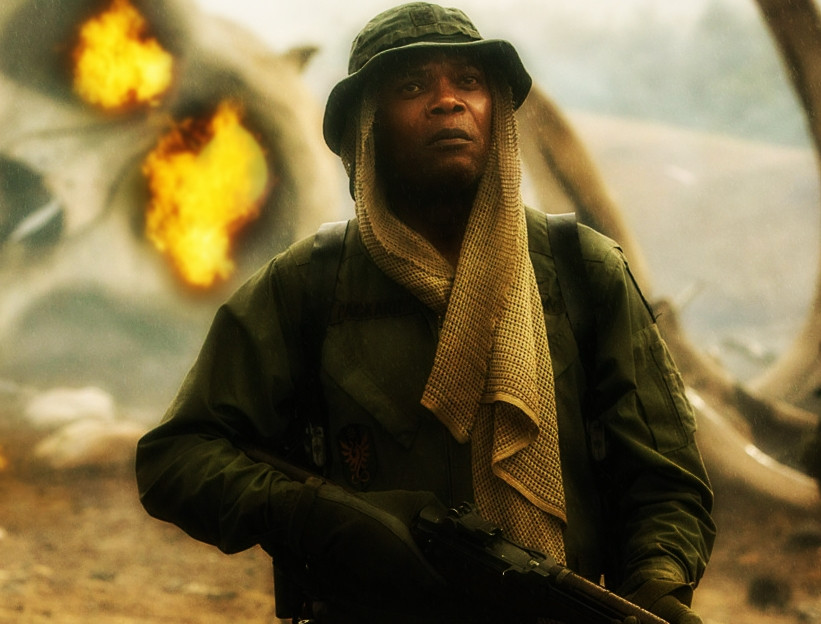 Skull Island
Skull Island
Monster movies often serve as cautionary tales about humanity’s hubris, mirroring the underlying themes found in war films. For those who grew up in the 1980s, monster movies were a staple, ranging from classic Universal monsters to the thrilling slasher era. Kaiju films, with their epic battles between colossal creatures, hold a particular charm, evoking a sense of childlike wonder despite their often simplistic plots and dated special effects. The announcement of Kong: Skull Island, a King Kong reboot set against the backdrop of the Vietnam War, was met with considerable excitement.
Kong: Skull Island Delivers Monster Carnage and Unexpected Musical Resonance
It’s rare for a film to perfectly meet expectations and still surprise, but Kong: Skull Island managed to do just that. While delivering the promised monster mayhem, the film also offered an unexpectedly comforting and powerful soundtrack. Set in the early 1970s during the Vietnam War, the movie, as is typical of Hollywood period pieces, utilizes music to firmly establish its setting. Kong: Skull Island embraces this convention, but with a twist that elevates the viewing experience beyond simple nostalgia.
The use of iconic tracks like Jefferson Airplane’s “White Rabbit” or Creedence Clearwater Revival’s “Run Through The Jungle” in Vietnam War films has become almost cliché. However, in Kong: Skull Island, these songs, instead of eliciting eye-rolls, induce a sense of familiar comfort. These songs, ingrained in popular culture, gain a new dimension when experienced through cinema sound systems, becoming as larger-than-life as the Kaiju creatures on screen. This familiar music, deeply associated with the Vietnam era, creates an unexpected bridge between the fantastical monster movie and the grim reality of war.
Beyond Cliché: Finding Deeper Meaning in Vietnam Era Anthems
 Skull Island: The Comfort of Music and War
Skull Island: The Comfort of Music and War
Hearing tracks like “Long Cool Woman (In A Black Dress)” followed by The Stooges’ “Down On The Street” prompts reflection on the source of enjoyment in Kong: Skull Island. Is it solely the thrill of monster battles, or is it also the nostalgic comfort of classic rock songs deeply connected to the Vietnam War era? This question finds its answer in a pivotal action sequence where Kong decimates a fleet of helicopters, set to the powerful strains of Black Sabbath’s “Paranoid.” The spectacle of a colossal ape destroying military helicopters to such an iconic rock anthem is undeniably impactful.
This fusion reveals that the two sources of nostalgia – monster movie thrills and Vietnam War era music – are intertwined. During the Vietnam War, music served as a powerful voice for both anti-war sentiment and the experiences of soldiers. Although removed from that era, the themes of frustration, hope, and raw honesty within these songs remain relevant today. In Skull Island, these classic rock anthems represent a time when, despite societal upheaval and uncertainty, there was a belief in the possibility of positive change and standing up for what is right. The “Vietnam The Song” within the film’s soundtrack is not just background noise; it’s a character in itself, adding layers of meaning and emotional depth.
A Unique Soundtrack Enhancing the Monster Movie Experience
The integration of classic rock into a King Kong movie might seem unconventional, yet it profoundly enhances the overall experience. This raises questions about the enduring appeal of both monster movies and Vietnam War era music. Is there a shared sense of nostalgia that resonates with audiences? While action movies are designed to be sensory experiences, and the music of that era is undeniably powerful, there seems to be a deeper connection. The Vietnam War may be over, but its impact and the emotions it evoked remain potent. The universal themes within these songs offer a sense of empowerment, bridging the past and present. This is akin to the comfort of revisiting childhood joys as an adult, finding renewed resonance and meaning.
Survival, Empowerment, and the Enduring Appeal of Kong
At its core, Kong: Skull Island is a high-octane action movie, offering the visceral pleasure of large-scale destruction. However, on a deeper level, its exploration of survival speaks to fundamental aspects of the human spirit. Whether facing fictional monsters or the very real horrors of war, the sense of empowerment found in both resonates deeply. Monster movies and Vietnam War era music tap into this shared human experience. Just as veterans command respect, Kong, in his domain, reigns supreme.
The timeless appeal of artists like Bowie, Iggy Pop, and Black Sabbath, whether accompanied by cinematic carnage or not, endures.
For more on Kong: Skull Island, visit KongSkullIslandMovie.com

